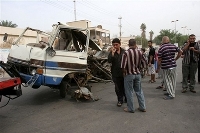Group of gunmen attack minibus heading to Baghdad
A group of gunmen in two cars attacked a minibus heading to Baghdad from a Shiite town north of the capital, killing seven passengers.

The bus, which left the town of Khalis, was driving near the violence-wracked city of Baqouba, 60 kilometers (35 miles) northeast of Baghdad, about 11:30 a.m., when it was ambushed outside the town of Hibhib, police said.
The attack underscored the sectarian violence and instability that continues to plague Diyala province north of Baghdad despite the 3-month-old security crackdown in Baghdad and the surrounding areas.
In western Baghdad, a roadside bomb detonated near a group of Iraqi soldiers patrolling the Sunni-dominated Adil neighborhood in western Baghdad about 10:15 a.m. Monday, killing three of the soldiers and injuring two others.
In the confusion of the attack, the soldiers fired near the office of Adnan al-Dulaimi, the leader of parliament's largest Sunni Arab bloc, the Iraqi Accordance Front, according to his office. No one was injured in the shootings.
The stepped up U.S. and Iraqi patrols of the capital during the crackdown have left the troops more vulnerable to attack by insurgents, military officials say.
The U.S. military reported Sunday that six U.S. soldiers on patrol in Baghdad were killed in a roadside bombing along with their interpreter on Saturday. A seventh soldier died in a blast Saturday in Diwaniya, a mostly Shiite city 80 miles south of the capital, where radical Shiite militias operate.
Those deaths brought the number of American troops killed in Iraq since Friday to at least 15 eight of them in Baghdad. So far, at least 71 U.S. troops have died in Iraq this month most of them from bombs.
Three more U.S. soldiers remain missing after an ambush south of Baghdad that killed four other soldiers and their interpreter. Thousands of soldiers continued combing through fields and questioning suspects as the search for the men continued Monday.
As part of the ongoing attacks, a mortar shell exploded Monday afternoon on the roof of Iraq's parliament building in the Green Zone compound in Baghdad, causing no injuries, said lawmaker Sabah al-Saadi.
"The shell landed almost above the office of the parliament speaker," said al-Saadi, who was at a committee meeting inside at the time. He said there was minor damage to the roof. An April 12 suicide bombing in the parliament building's dining hall killed one lawmaker.
A few hours later several more mortar rounds were fired. One of them appeared to land in the Green Zone and another near the nearby national theater. The U.S. Embassy did not immediately respond to a request for comment.
The blasts Monday were part of a sharp increase in recent weeks of mortar attacks on the Green Zone, which houses the U.S. Embassy, the Iraqi parliament and other government offices. The compound, on the banks of the Tigris River, is surrounded by cement walls and patrolled by U.S. and Iraqi soldiers as well as private security guards.
Amid the almost daily mortar barrages, people living inside the area have questioned whether it truly is safe to remain there.
Meanwhile, Abdul-Aziz al-Hakim, leader of Iraq's largest Shiite party, said that tests carried out in the United States revealed that he was suffering a "limited tumor" and that he will be treated in Iran.
Al-Hakim did not say where the tumor was, but officials close to him said he was diagnosed with lung cancer after undergoing tests last week at the University of Texas M.D. Anderson Cancer Center in Houston. He was expected to undergo chemotherapy treatment in Iran, according to the officials, who spoke on condition of anonymity because they were not authorized to discuss his condition.
"The results of those tests in America showed a number of limited inflammations and a limited tumor," al-Hakim, 57, said in comments from Iran broadcast by Iraqi state television.
He said he was told "they can be easily controlled and treated."
"My treatment will not last long and I will return home in the nearest opportunity, God willing," he said.
Al-Hakim's absence is likely to create disarray in his Supreme Islamic Council in Iraq a Shiite party the U.S. is counting on to push through benchmark reforms.
In other violence, the Iraqi newspaper Azzaman reported Monday that one of its reporters, Ali Khalil, 22, was kidnapped while leaving a relative's house in the increasingly volatile Baiyaa neighborhood of Baghdad and found dead several hours later. Khalil was survived by his wife and one-week-old baby, the newspaper said.
The attack came three days after two Iraqi journalists working for ABC News were ambushed and killed on their way home from work. The New York-based Committee to Protect Journalists said 104 journalists not including Khalil have been killed since the 2003 U.S.-led invasion of Iraq. About 80 percent of the journalists killed were Iraqi, according to CPJ.
In Muqdadiyah, about 90 kilometers (60 miles) north of Baghdad, two gunmen shot dead two police officers as they walked by the police station.
Insurgents also fired mortar rounds into a bank in Baqouba as customers were waiting in line to collect their pensions about 10 a.m., killing two people, police said.
Violence also hit the southern city of Basra, with gunmen killing one police officer and wounding another in an attack on their patrol, police said. Police also reported that the chief of customs in Basra, Col. Khalaf al-Badran, escaped injury when a roadside bomb struck his convoy as it left the airport.
Subscribe to Pravda.Ru Telegram channel, Facebook, RSS!


